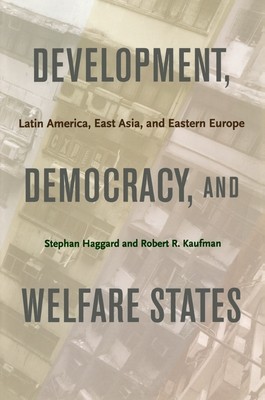
- We will send in 10–14 business days.
- Author: Stephan Haggard
- Publisher: Princeton University Press
- ISBN-10: 0691135967
- ISBN-13: 9780691135960
- Format: 15.5 x 23.1 x 2.8 cm, minkšti viršeliai
- Language: English
- SAVE -10% with code: EXTRA
Reviews
Description
This is the first book to compare the distinctive welfare states of Latin America, East Asia, and Eastern Europe. Stephan Haggard and Robert Kaufman trace the historical origins of social policy in these regions to crucial political changes in the mid-twentieth century, and show how the legacies of these early choices are influencing welfare reform following democratization and globalization.
After World War II, communist regimes in Eastern Europe adopted wide-ranging socialist entitlements while conservative dictatorships in East Asia sharply limited social security but invested in education. In Latin America, where welfare systems were instituted earlier, unequal social-security systems favored formal sector workers and the middle class. Haggard and Kaufman compare the different welfare paths of the countries in these regions following democratization and the move toward more open economies. Although these transformations generated pressure to reform existing welfare systems, economic performance and welfare legacies exerted a more profound influence. The authors show how exclusionary welfare systems and economic crisis in Latin America created incentives to adopt liberal social-policy reforms, while social entitlements from the communist era limited the scope of liberal reforms in the new democracies of Eastern Europe. In East Asia, high growth and permissive fiscal conditions provided opportunities to broaden social entitlements in the new democracies. This book highlights the importance of placing the contemporary effects of democratization and globalization into a broader historical context.EXTRA 10 % discount with code: EXTRA
The promotion ends in 21d.20:52:31
The discount code is valid when purchasing from 10 €. Discounts do not stack.
- Author: Stephan Haggard
- Publisher: Princeton University Press
- ISBN-10: 0691135967
- ISBN-13: 9780691135960
- Format: 15.5 x 23.1 x 2.8 cm, minkšti viršeliai
- Language: English English
This is the first book to compare the distinctive welfare states of Latin America, East Asia, and Eastern Europe. Stephan Haggard and Robert Kaufman trace the historical origins of social policy in these regions to crucial political changes in the mid-twentieth century, and show how the legacies of these early choices are influencing welfare reform following democratization and globalization.
After World War II, communist regimes in Eastern Europe adopted wide-ranging socialist entitlements while conservative dictatorships in East Asia sharply limited social security but invested in education. In Latin America, where welfare systems were instituted earlier, unequal social-security systems favored formal sector workers and the middle class. Haggard and Kaufman compare the different welfare paths of the countries in these regions following democratization and the move toward more open economies. Although these transformations generated pressure to reform existing welfare systems, economic performance and welfare legacies exerted a more profound influence. The authors show how exclusionary welfare systems and economic crisis in Latin America created incentives to adopt liberal social-policy reforms, while social entitlements from the communist era limited the scope of liberal reforms in the new democracies of Eastern Europe. In East Asia, high growth and permissive fiscal conditions provided opportunities to broaden social entitlements in the new democracies. This book highlights the importance of placing the contemporary effects of democratization and globalization into a broader historical context.

Reviews